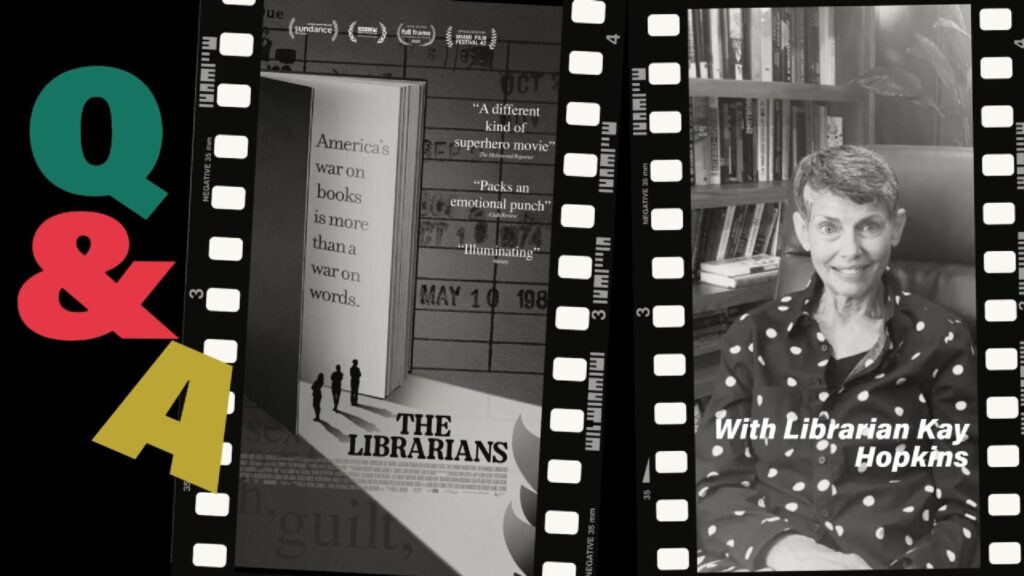
By Sofia Lamento, Free State Festival Contributor
In celebration of The Librarians premier, retired librarian and lifelong educator, Kay Hopkins, sat down with Festival staff to discuss the impact of banned books, the role of librarians, and why access to diverse stories matters now more than ever.
“I’ve always been fascinated by information and reading and wanted to be able to give that to other people or help them access it,” Hopkins said.
As a former Kansas City classroom teacher turned school librarian, she obtained a Master’s of Library Science. During her studies she took a graduate course in information literacy which sparked her deep interest in helping young people evaluate and use information effectively.
When it comes to censorship and book challenges, Hopkins clarified a common misconception.
“The term ‘banned books’ is a little misleading,” she explained. “Generally the book is reviewed and there is no need to actually ban the book,”
That process often involves a review committee, comprised of librarians, administrators, parents, and students. The goal, Hopkins said, is not to agree with every viewpoint but to ensure that library collections reflect a range of voices and experiences.
“No library can have every book anyway, so you do make decisions based on your patrons. You want to make sure that all patrons are represented.”
Hopkins emphasized that restricting access to books, especially those that explore identity and sexuality, limits not just intellectual freedom but human connection. “We’re losing opportunity,” she stated, pointing to the wide spectrum of human experience.
“Humans are incredibly diverse,” she said. “To limit our understanding of those in any way by challenging some viewpoint that maybe makes us uncomfortable robs us of the opportunity to know each other more fully.”
She noted that much of the current pushback centers around the fear that a book might somehow change a child’s identity, a fear she believes is misplaced. Instead, Hopkins said, literature can offer young people and adults alike a safe space to explore who they are, or who they are not.
“I think sometimes that gets lost in the equation. Both are really valid experiences. ‘Here I am finally I see myself,’ or ‘Okay, now I get it. And that’s not what’s going on with me.'”
She added that characters in novels, unlike people you may hear about in the news, can help readers empathize with situations. When you encounter a character in a novel who’s made that choice or faced that trauma, suddenly, it makes sense.
“If you read [about], maybe, a character in a book who has done such a thing, experienced such a thing, you can understand it,” she said. “Even if it’s still not you, you can understand how it is them.”
Hopkins reflected on the power of literature to expand empathy, even in the most unexpected places. She pointed to The Anomaly, a novel that follows the life of a hitman, as an example of how fiction can challenge assumptions and offer insight into complex human behavior.
“You’re brought into this book with his story,” she explained. “He’s also a father and husband, very loving. It’s two separate lives.”
Even though, by the character’s own admission, many of the people he kills are good people, Hopkins found herself wrestling with that contradiction.
“I cannot reconcile in my mind taking money to kill people,” she said. “But I could understand that in a way that this was another human, a complex human who I did not want to be, did not want to emulate, but he had a story and a way of being.”
When asked what she would say in a public service announcement about banning books, Hopkins kept it blunt: “Simply don’t. Let’s not ban books.”
Hopkins acknowledged the role parents play in guiding their children’s reading but emphasized that this authority doesn’t extend beyond their own household. Instead of trying to ban books, she suggests open conversation between parents and children.
“While you as a Parent have the absolute right to have input and even control over what your child reads, you do not have that right for any other person. And you might want to, instead of keeping your child from reading it, read it with them. Talk about it. Talk about why you are concerned. Help them walk through the issues that you see.” said Hopkins.
Through Hopkins’ perspective, one truth stands out: books are not just for information. They’re tools for empathy, identity, and understanding each other, and themselves, a little better.
Watch the interview here!
